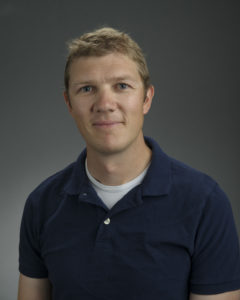Focus on Andrew Hoegh…..a DAC alumnus interview

Andrew Hoegh, DAC alumni and assistant professor of statistics at Montana State University
After Andrew Hoegh graduated from Virginia Tech with a Ph.D. in statistics in 2016, he headed northwest to Bozeman, Montana, to join Montana State University as assistant professor of statistics. That same year, there was more good news for Hoegh. “Bayesian Model Fusion for Forecasting Civil Unrest,” which he co-authored with his DAC advisor Scotland Leman; DAC Ph.D. student Parang Saraf; and DAC Director Naren Ramakrishnan, garnered the Jack Youden Prize for Best Expository Paper in the 2015 issues of Technometrics, a journal published by the American Statistical Society.
In a recent interview Hoegh talked about life in Montana and reflected back on his time as a DAC Ph.D. student and brought us up to date.
You earned your B.A. from Luther College in Iowa and then went on to get your M.S. from Colorado School of Mines. What attracted you to Virginia Tech?
My prospective visit sealed the deal. I enjoyed my interactions with the statistics faculty and Virginia Tech offered me the very appealing opportunity of working on the massive and challenging problem of civil unrest. Also, I fell in love with Blacksburg.
What had the most impact on you while you were working toward your Ph.D. at DAC?
For me, the “what” is a “who.” Without a doubt, my advisor Scotland Leman had the largest impact on my professional career trajectory. His guidance offered the perfect balance of structure and freedom that allowed me to flourish as a researcher.
How are you using now what you gained from your DAC experience?
The ability to think through big, challenging problems and, through research, identify the best solutions has been invaluable as my interest in exploring spatial and spatiotemperal Bayesian statistical modeling continues.
As you transitioned from Ph.D. student to professional academic, were there any real surprises?
While I certainly enjoy teaching, I did not realize that preparing lectures and grading student’s work are such solitary activities. At times, I miss the collaborative chaos of working as a graduate research assistant.
You mentioned a budding computer scientist in the family?
Yes, my six-year old daughter Eleanor loves to write code! Both Eleanor and two-year-old Georgiana were born while I was getting my Ph.D. at DAC.
Any practical advice you can offer current Ph.D. students?
It might seem like you are already too busy, but take advantage of everything graduate school has to offer, both professionally and personally. I also recommend looking for prospective jobs as soon as you start school. This will enable you to identify your “dream jobs” and you can then build the necessary skills to be qualified for those positions upon graduation.
How do you like to spend your leisure time?
With my wife, Emma, and daughters, enjoying the great outdoors of Montana. In addition to her already mentioned interest in coding, Eleanor is quite an expert skier.
.